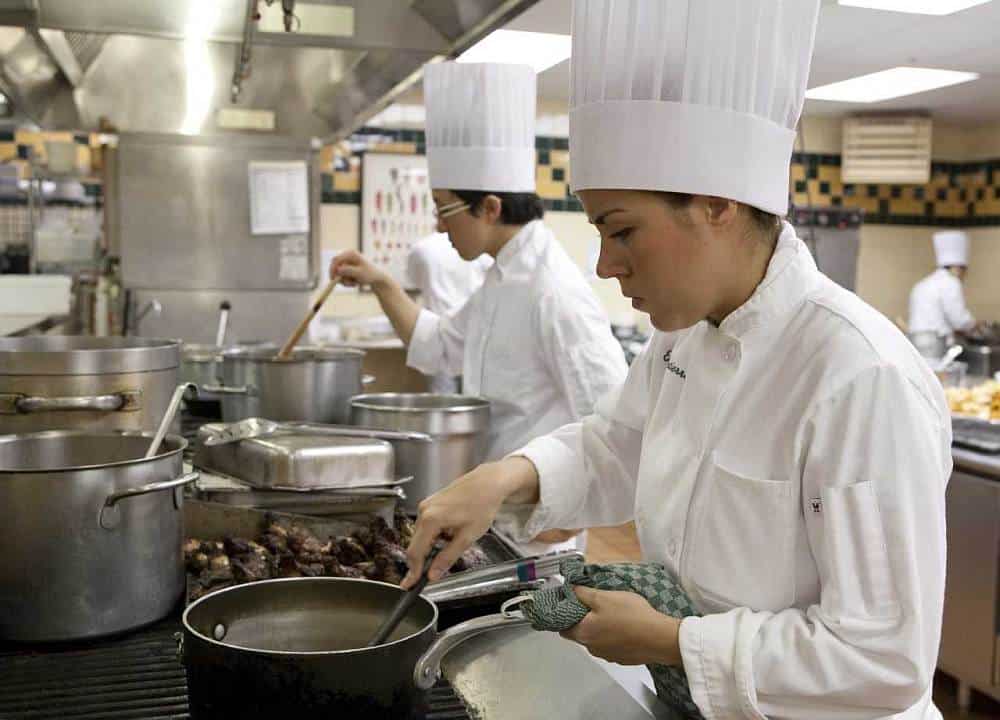
What does it take to become a chef? Knowledge? Experience? Talent? Passion? All of the above?
Honestly, the answer can be complicated and depends on who you ask. “Chef” is as much an identity as it is a profession, a leadership role that’s evolved to mean different things to different people.
To keep things simple, this post will look at the training needed to become a chef, some of the different types of chef roles, the responsibilities you should expect as a chef, and some advice on how you advance your career.
What Does a Professional Chef Do?
The title “chef” originated in France around the 19th century. It’s the shortened form of “chef de cuisine” or, literally, “chief of the kitchen.” This context is important because, today, anyone with a food blog can refer to themselves as a “home chef,” but there’s an important distinction between a professional chef and someone who knows how to cook.
Anyone who can follow established recipes—whether from a book, memory, or direction—to prepare food is a cook. In most restaurants and professional kitchens, numerous cooks help prepare ingredients, work specific stations, and assemble dishes. The difference between a cook and a chef is that a chef not only needs to know how to cook, but also how to:
- Assist and instruct others in how to cook and prepare dishes
- Master specific cooking techniques and an understanding of ingredients
- Manage kitchen operations to ensure food quality and customer service
The professional chef manages part of the kitchen, if not the entire kitchen, and they’re the ones responsible for ensuring customers are happy and their restaurant or organization can earn a profit. The title of “chef” is something that has to be earned through hard work, knowledge of the culinary craft, and leadership ability. While there are many top-notch cooks out there, they aren’t considered chefs until they actually run a team and their station within a professional kitchen.
“You don’t have to be a chef to be able to shave a truffle,” says Chef Bruce Mattel, former CIA senior associate dean of culinary arts. “But you do need to be a chef to know what a good quality truffle is, to be able to source it properly, and to be able to provide it to the customer as a special experience.”
Types of Chef Career Paths
Part of the challenge in explaining how to become a chef is that there are several different chef positions. While a kitchen in a small restaurant may only have a head chef and a few assistant cooks, many large kitchens have several chefs, each with different roles, responsibilities, and training.
These larger kitchens often follow the “kitchen brigade” system to assign roles and responsibilities. Even kitchens that don’t explicitly adhere to the traditional brigade system may follow a similar hierarchy. Once someone proves their skill as an entry-level cook, they’ll advance up the ranks. Here’s what a typical progression may look like:
- Commis Chef: Also called junior cooks, line cooks, or assistant chefs, this role involves assisting other chefs, prepping ingredients, and learning station basics.
To earn a commis chef position, you’ll need formal culinary training or an apprenticeship and some hands-on kitchen experience as a cook. To advance, you’ll need to spend at least a couple of years mastering station-specific skills, demonstrating reliability, leadership, and strong time management. - Station Chef: The station chef, or chef de partie, has proven their ability to manage others and can take charge of a specific area of the kitchen. Station chefs oversee a team of line cooks in a specific kitchen station and ensure consistent delivery of their assigned dishes. Depending on the size and cuisine of the kitchen, there may be several station chef positions.
Common Station Chef Positions
| Vegetable Chef (Entremetier) Vegetable dishes | Pastry Chef (Patissier) Pastries and desserts | Butcher (Boucher) Meats and poultry |
| Sauce Chef (Saucier) Sauces, soups, and stews | Fish Chef (Poissonnier) Fish and seafood | Relief Chef (Chef de Tournant) Fills positions as needed |
| Grill Chef (Grillardin) Grill station | Fry Chef (Friturier) Fry station | Pantry Chef (Garde Manger) Chilled dishes |
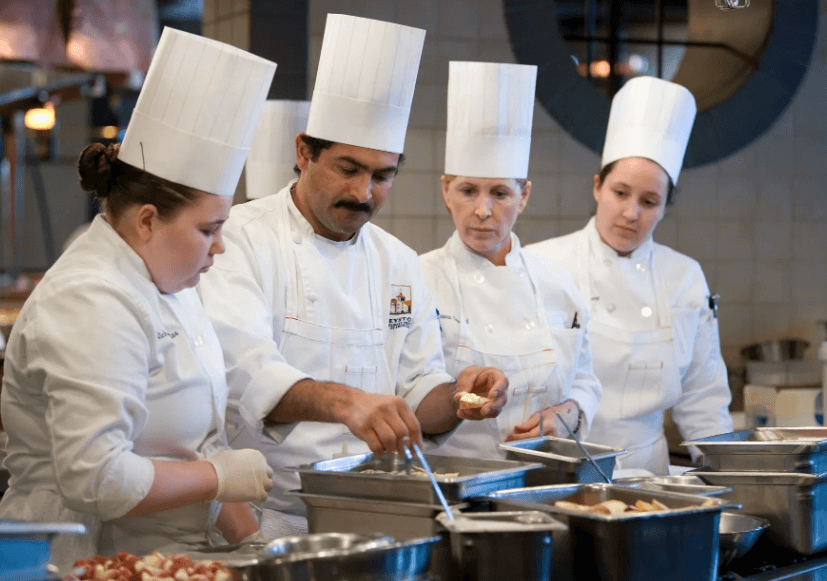
- Sous Chef: The sous chef is the second-in-command over the kitchen and directly supports the head chef. The sous chef oversees day-to-day operations, supervises staff, and helps with ordering and scheduling. To become a sous chef, you usually need several years of experience as a chef de partie, demonstrating strong leadership, menu knowledge, and kitchen management skills. You’ll need to prove you’ve mastered the operations of menu creation, budgeting, and staff management while also showing creativity and consistency with your cooking to advance to the position of head chef.
- Head Chef: The head chef, or chef de cuisine, is the one responsible for the entire kitchen, from menu creation to kitchen management. They work directly with suppliers and vendors, as well as front-of-house staff, to ensure that everything operates smoothly, efficiently, and within budget.
It will take roughly six to 10 years of hard work, dedication, and training to advance to a head chef position. You also need to know how to take advantage of opportunities, which requires networking and building relationships throughout the industry. - Executive Chef: An executive chef doesn’t work in one kitchen, but oversees the culinary direction of higher-end restaurants or commercial kitchens with multiple locations. As such, most restaurants won’t have an executive chef position. Executive chefs are often the “big name” chefs you’ve heard or seen on TV who own and operate their own line of restaurants, such as Gordon Ramsey, Bobby Flay, Dominique Crenn, Sara Moulton ’77, and Duff Goldman ’98.
Even though executive chefs have a strong culinary background, they spend more time managing operations than cooking in the kitchen. The chefs who earn this role have developed their culinary career for at least a decade and have demonstrated strong business management skills, especially in overseeing strategic operations, budgeting, and hiring.
Alternate Chef Career Paths
You’re not limited to chef positions within a restaurant kitchen. Depending on your interests, there are a variety of chef positions you can work toward, including:
- Personal Chef: A personal chef prepares customized meals for clients from busy families and high-net-worth individuals to larger organizations or businesses. They often work solo, handling everything from cooking and cleanup to administrative tasks such as scheduling, invoicing, and client communications. It’s this “all-in-one” service that distinguishes a personal chef from a hired cook.
Personal chefs need to build a strong network of clients and manage their own business in addition to having a strong culinary education and established experience. It’s a lot of extra work to succeed as a personal chef, but it comes with a level of flexibility and independence you won’t find in a lot of other chef roles. - Research and Development Chef: A research and development (R&D) chef brings their skills and knowledge of high cuisine into the product development lab. You’ll find this position in larger food companies and test kitchens that are trying to innovate new food products or improve food manufacturing processes.
As an R&D chef, you’ll collaborate with scientists and engineers, using your knowledge of flavor profiles, ingredient behavior, and sensory experience to create manufacturable-to-scale processes that can consistently reproduce dishes in large-scale production. This position requires an understanding of culinary science, which includes a scientific understanding of ingredients, as well as a mastery of modern and industrial cooking tools and techniques. - Catering Director: A catering director is essentially an on-the-go head chef, as they oversee the planning, coordination, and execution of large-scale food service events such as weddings, conferences, and banquets. They manage budgets, design menus with chefs, negotiate vendor contracts, and ensure exceptional guest experiences.
They need to build strong food business skills in organization, communication, and leadership, on top of extensive knowledge of menu design, budgeting, food safety, and event operations. They lean more toward the business side with a focus on strategic thinking and customer service, though a culinary background can be essential for balancing creativity with efficiency.
Restaurants, catering, and research are only the tip of the iceberg when it comes to possible working environments. Other possible chef career paths include:
- Hospitality: If you enjoy organizing people and ensuring customer satisfaction, you could work as a consultant or hospitality manager for hotels, casinos, or on cruise ships.
- Higher Education: If you have a talent for mentoring others, you could take your knowledge and experience and help support the next generation of chefs.
- Health and Wellness: There’s increased interest in how people can use food to improve their health and well-being. You could utilize your knowledge of ingredients in culinary therapeutics.
- Media: Food media is as hot as ever, and there’s always room for personable and charismatic chefs to share their love of food on social media, television, and streaming services.
How to Become a Chef: Step-by-Step Guide
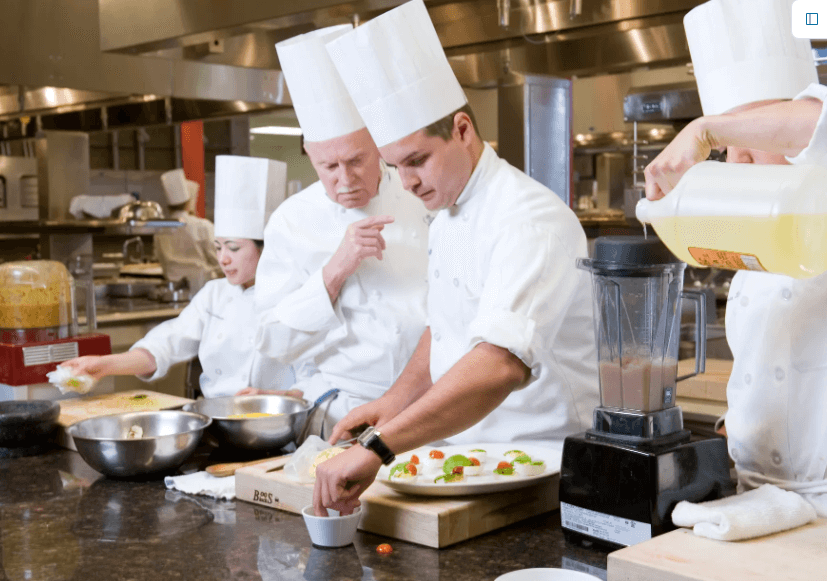
There are many possible paths to becoming a professional chef, and everyone will have their own experiences, interests, and best practices. This guide isn’t meant to show the one best way to become a chef, but to offer advice on how to give yourself the best chance for success.
- Start by Researching Different Roles, Specializations, and Kitchen Environments
The culinary world is vast, and it’s constantly changing. Give yourself a baseline understanding by reading up on the differences between roles and asking people in the industry—cooks, servers, hosts, bussers, and more—about their work experiences. The more you’re able to understand how things work, the better you’ll be able to determine which roles and environments might be your best fit.
You’ve already got a leg up by reading this blog post and visiting CIA’s website. Keep checking our blog for regular updates on news, spotlights, and deep dives into the food and hospitality industry. You can also follow professional associations such as the Association of Professional Chefs, news sites such as Nation’s Restaurant News, or publications such as KTCHNrebel or Cooks Illustrated.
- Pursue Education and Training Options
Many chefs get their start in entry-level positions and work their way up. If, however, your goal is to be a leader in the kitchen—a true chef—then a college education from a well-respected institution will give you a competitive edge over others vying for the same positions. The connections and networking opportunities you get at CIA can also help move your resume to the top of the pile.
Formal education can provide structure, skill-building, and help you earn valuable credentials. Most importantly, you get the opportunity to explore different cuisines and environments to better identify where you’re going to excel. You have several formal education options, all of which can teach you foundational and advanced cooking techniques, ingredient functions, global cuisines, and how to manage a successful team and business.
- Bachelor’s degree programs at culinary colleges offer immersive, hands-on instruction in both food and hospitality. Concentrations can enable you to explore options you wouldn’t get just pulling shifts at the local diner, such as training in culinary science, menu management, and farm-to-table practices, and a deep dive into global cuisines.
- If you have prior experience or education and want to quickly earn your culinary degree, you can choose an associate degree program or a bachelor’s degree completion program.
- Specialize your training even further with a master’s degree. You could work with experienced industry innovators and executive chefs and learn how to operate a great restaurant, or study with experienced entrepreneurs and build a deeper understanding of business to run their own company.
Understand that, even when students graduate from a culinary college such as CIA, they are not yet chefs. However, the knowledge they’ve gleaned, skills they’ve acquired, and people they’ve met during their college education put them on a fast track to run a restaurant or other professional kitchen and earn the respect that comes with having “chef” embroidered on their jacket.
- Seek Entry-Level Roles for Hands-On Experience
Building real-world practice is a necessary part of the journey to becoming a professional chef. Whether you take a part-time position to learn the ropes or build work experience through a higher-education program, look for opportunities to work with other professionals to learn from them and grow into your career:
- Apprenticeships and internships can help you apply what you’ve learned in school and give you a working environment to practice and develop new techniques. Internships are effective ways to experience supervised work where you’ll be coached on your timing, organization, and execution.
- Early work experience, such as prep cook, kitchen assistant, or line cook, gives you direct experience working with others, providing you with valuable experience with professional workflows, working with industry tools, and learning effective teamwork.
- Practice and Build Your Core Skills
Practice is essential to improving your cooking skills and techniques. Build on your formal training by regularly practicing your knife skills, food preparation, and plating techniques, as well as experimenting with flavors and ingredients. Practice as much as possible at home and look for opportunities to solicit feedback from fellow chefs.
Once you’ve gained some experience, you can even enter cooking competitions to challenge yourself and earn potential accolades. Look for opportunities such as:
- The Kikkoman Student Innovation Challenge
- CIA’s Pizza Cook-Off
- CIA’s Mac and Cheese Cook-Off
- CIA’s Tri-Wizard Tournament
- Network, Attend Events, and Join Organizations
Some of the biggest chefs in the world got their start when a friend or acquaintance gave them an opportunity. Success in the kitchen, as much as any workplace, is often about who you know as well as what you know. Make an effort to meet and connect with other culinary professionals at events and try to join industry organizations. Finding mentors and connecting with fellow chefs will open doors to jobs, collaborations, and continued learning. Put yourself out there and start making connections by:
- Attending food festivals, trade shows, and culinary expos
- Joining organizations such as the American Culinary Federation (ACF)
- Taking advantage of the extensive alumni network offered by culinary colleges
Salary Expectations and Job Outlook
Just like any industry, the pay for entry-level positions will be lower than an experienced chef’s salary. Additionally, starting positions such as line cook are usually paid hourly rather than salaried.
The U.S. Bureau of Labor Statistics (BLS) estimates the median hourly wage for cooks to be $17.19, with total take-home pay estimated to be between $37,000 and $52,000 annually. Of course, pay will vary based on your geographic location and the type of kitchen you’re working in. What you gain most from entry-level positions are the skills, experience, and connections to help you advance into higher-paid salaried positions.
The U.S. BLS lists the median annual wage of chefs and head cooks as $60,990, while salary ranges for chefs in the U.S. can reach even higher*:
- Sous Chef: $55,000–$87,000
- Caterer: $46,000–$83,000
- Executive Chef: $73,000–$123,000
- Personal Chef: $84,000–$154,000+ (varies by clientele)
As for job stability, people will always need to eat, making being a chef one of the most stable positions for employment. The BLS projects that the employment of chefs and head cooks will grow 7% from 2024 to 2034, much faster than the average for all occupations.
An education at a culinary college such as CIA will help you build skills faster than you might through self-teaching or on-the-job experiences. The college experience is also advantageous in forming long-lasting relationships with other culinary professionals that can open doors to new opportunities. Additionally, in our experience, salaries for CIA graduates track above the national average listed by the BLS.
* Salary estimates were sourced from Glassdoor in October 2025.
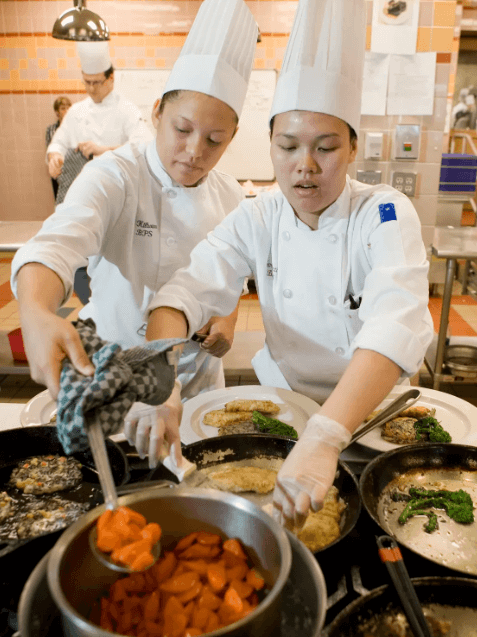
An Example Day in the Life of a Chef
Let’s take a look at a typical day in the life of a chef de partie, or station chef. The day often begins hours before service starts, prepping ingredients, organizing the station (an essential part of mise en place), and checking that all tools, equipment, and supplies for the station are ready. No matter the station—whether grill, sauté, pastry, or garnish—the station chef has to ensure that her team will have everything they need to execute on precision and timing during service
Once service begins, orders will flow in rapidly, and the chef must cook, plate, and coordinate dishes in sync with the rest of the kitchen brigade. Communication and teamwork are constant, as one small delay can throw off the entire rhythm of service. The work is physically demanding, with hours spent on one’s feet, exposure to heat, and the need to stay focused even under pressure. Any mistake can be costly, delaying service and wasting ingredients, so attention to detail and a level head are essential.
After service, the chef de partie helps clean down their station, ensures that ingredients are stored properly, and reviews prep lists for the next day. The entire routine can stretch into 10–12-hour days and includes working on weekends and holidays. It’s a lot of work but, for most chefs, the satisfaction outweighs the exhaustion.
What makes the role so rewarding is the creativity and craftsmanship involved in transforming raw ingredients into beautiful, flavorful dishes. There’s a deep sense of camaraderie in the kitchen, fueled by a shared passion for food: the joy of cooking, learning, and creating experiences that bring people together.
How to Advance Your Chef Career
Every great dish requires great ingredients; similarly, what you get out of your career depends on what you put into it. You can—and should—support your career progression with specialized education, mentorship, and real-world experiences. Here are some additional tips on how to secure a successful chef career.
- Stay Current with Food Trends and Techniques
Learning classic techniques is essential to building your skills, but learning new trends and practices is part of what makes being a chef exciting. Staying ahead of dietary trends and new technologies keeps your skills sharp and relevant. Showing employers and clients that you’re invested in professional growth makes you more competitive as a hire. - Work in Different Kitchen Settings to Gain Hands-On Experience
As much as the kitchen brigade system works to establish order across kitchens, different kitchens operate in their own way and have their own vibe. Gaining experience in a variety of environments broadens your skillset and shows future employers that you’re versatile and adaptable. Working in diverse kitchens will enable you to develop unique skills and help you find your true passion as a chef.
“Being part of CIA’s alumni network is like being in a fraternity, a fellowship. There’s an instant connection. One of the greatest assets CIA has is the network of alumni in top kitchens all over the world. Cooking is global and can take you anywhere you want to go.”
—Deuki Hong ’09
Executive Chef/Owner, Sunday Bird

- Develop Soft Skills Such as Communication, Time Management, and Stress Control
Your success as a chef comes down to how well you can work efficiently. If you want to lead teams, then you need to understand how to clearly communicate, manage tight schedules, and stay composed in high-pressure situations. More importantly, these “soft skills” are highly transferable and will follow you into other opportunities if you ever want to branch into teaching, consulting, or opening your own restaurant. - Seek Out Mentors Who Can Offer Guidance and Career Advice
Behind every great chef is a mentor. Find yours by placing yourself in environments where you can interact with experienced chefs, instructors, or alumni. Mentors provide more than advice; they’re a great source for job leads and are invaluable as industry connections. A good mentor can introduce you to unique opportunities, help you make smarter career decisions, and offer you insider knowledge.
“It’s nice to have fun in school but apply yourself. Get a mentor and ask questions. Every moment is an opportunity. Learn to understand negotiating tactics, contracts, and the business side of things, and work hard to articulate a thought well. Learn to talk about food, taste, and your experience. The future is in front of you and, if you’re like me, you’ll never want to take your apron off.”
—Scott Conant ’92
Chef/Restaurateur/Author/TV Personality

One of the best ways to become a chef is to get a quality culinary college education. A real culinary college, such as the Culinary Institute of America, provides the extensive hands-on experience necessary to become a highly skilled cook. It’s also the place to get the management education and broader knowledge of food, beverage, and hospitality—as well as liberal arts, history, and culture—necessary to become a leader.
“I’m quite sure that my degrees from CIA have gotten me every job I’ve had so far. Employers know they’re investing in quality when they recruit a CIA graduate.”
—Tasha Mabin ’10
Catering Director, The Compass Group USA
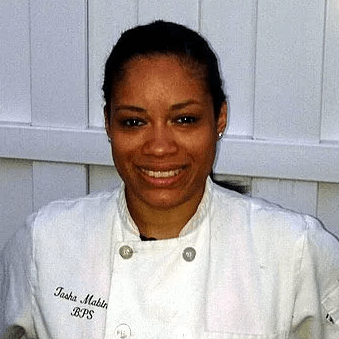
FAQs
How long does it take to become a professional chef?
Becoming a professional chef typically takes two to four years, depending on your education and experience. You could try to find an open entry-level position or build your skills with a culinary degree or apprenticeship, then spend several years working up from commis or line cook roles to more advanced positions.
Do professional chefs make a lot of money?
Chef salaries vary widely based on experience, location, and type of establishment. While entry-level chefs earn modest pay, experienced chefs—especially executive or private chefs—can make six figures in top restaurants, hotels, or catering businesses.
What qualifications do you need to become a chef?
Chefs are leaders in the kitchen, which means in addition to demonstrating a mastery of cooking techniques, they need to be effective leaders and managers. Formal culinary training helps to build further skills in other areas such as food safety and business management. It’s your overall experience and proven ability that will qualify you for higher-level chef positions.
Is a chef a high-demand job?
Yes! The culinary field continues to grow, with strong demand for skilled chefs in restaurants, hotels, catering, and food innovation. The rise of global cuisines, specialty diets, and hospitality expansion creates steady opportunities for trained professionals.
Ready to Take Your First Steps Toward a Culinary Career?
We’ll be happy to assist you and answer any questions about our program.
